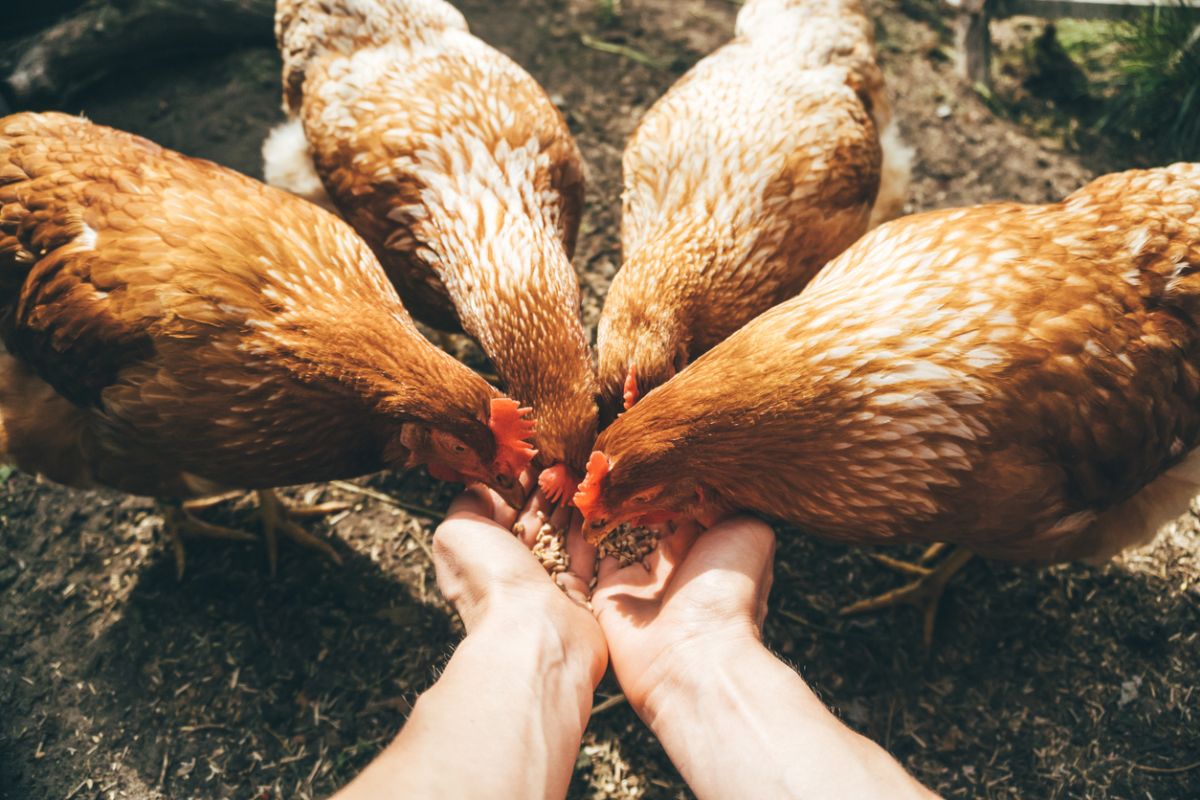If you ever wondered, “what can chickens eat?” then you’re not alone. There are many things that chickens can snack on, but there are also many hazardous food items too.
So, what do chickens eat, and what are favorite treats for chickens? Choosing a variety of snacks for your birds can help keep them healthy and happy.
What Can Chickens Eat?
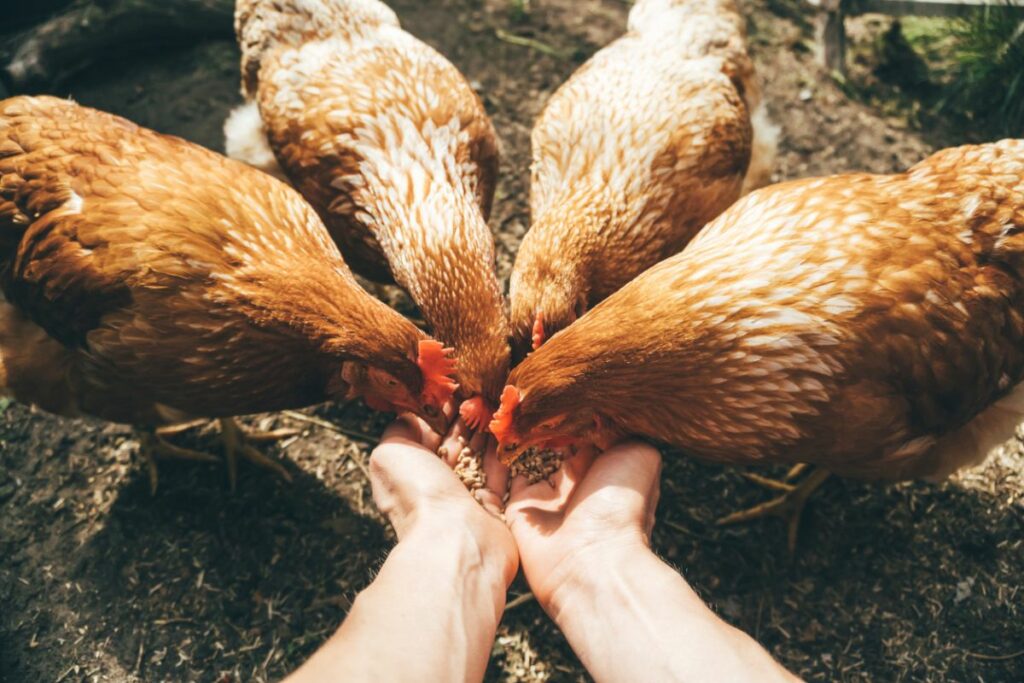
There’s a long list of foods chickens can eat, so here’s a “what can chickens eat list” to help you see a quick overview of the foods.
| Fruits | Vegetables | Other |
| Grapes | Carrots | Bread |
| Tomatoes | Arugula | Oatmeal |
| Strawberries | Potatoes | Rolled Oats |
| Watermelon | Corn Husks | Sunflower Seeds |
| Apples | Peas | Peanut Butter |
| Pineapple | Lettuce | Peanuts |
| Bananas | Cabbage | Honey |
| Mango | Kale | Pecans |
| Cantaloupe | Sweet Potatoes | Tuna |
| Kiwi | Leeks | Shrimp |
| Blackberries | Radishes | Cashews |
| Pomegranate | Basil | |
| Peaches | Cinnamon | |
| Pumpkin | Popcorn | |
| Bell Peppers | ||
| Zucchini | ||
| Coconut |
What Fruits Can Chickens Eat?
Fruit is healthy for chickens just like it is for humans, so there are a lot of options for chicken snacks. Here’s a quick list of fruits chickens can have. If you want to know more details about servings, benefits, and risks, keep reading.
- Grapes
- Tomatoes
- Strawberries
- Watermelon
- Apples
- Pineapple
- Bananas
- Mango
- Cantaloupe
- Kiwi
- Blackberries
- Pomegranate
- Peaches
- Pumpkin
- Bell Peppers
- Zucchini
- Pickels
- Coconuts
Can Chickens Eat Grapes?
Yes, grapes for chickens are healthy and safe. They’re high in vitamins A, B, and C. However, full grapes can be a choking hazard, so it’s safest if chickens have grapes after you chop them up.
Can Chickens Eat Tomatoes?
Yes, chickens and tomatoes go well together, but tomatoes should only be served to them if they’re ripe. They’re packed with lots of essential nutrients, including vitamin C, vitamin K, fiber, potassium, and vitamin B9. Do not feed green tomatoes to your flock.
Can Chickens Eat Strawberries?
Yes, chickens and strawberries are a perfect combination. This sweet fruit is a favorite treat for many chickens, and it’s packed with vitamins and antioxidants. Strawberries also have quercetin, which has anti-inflammatory properties.
Can Chickens Eat Watermelon?
Yes, watermelon for chickens is the perfect summer snack. Chickens can have watermelon in all forms, including the rind and seeds, which are safe. A fun way to serve it is to puree it and freeze it.
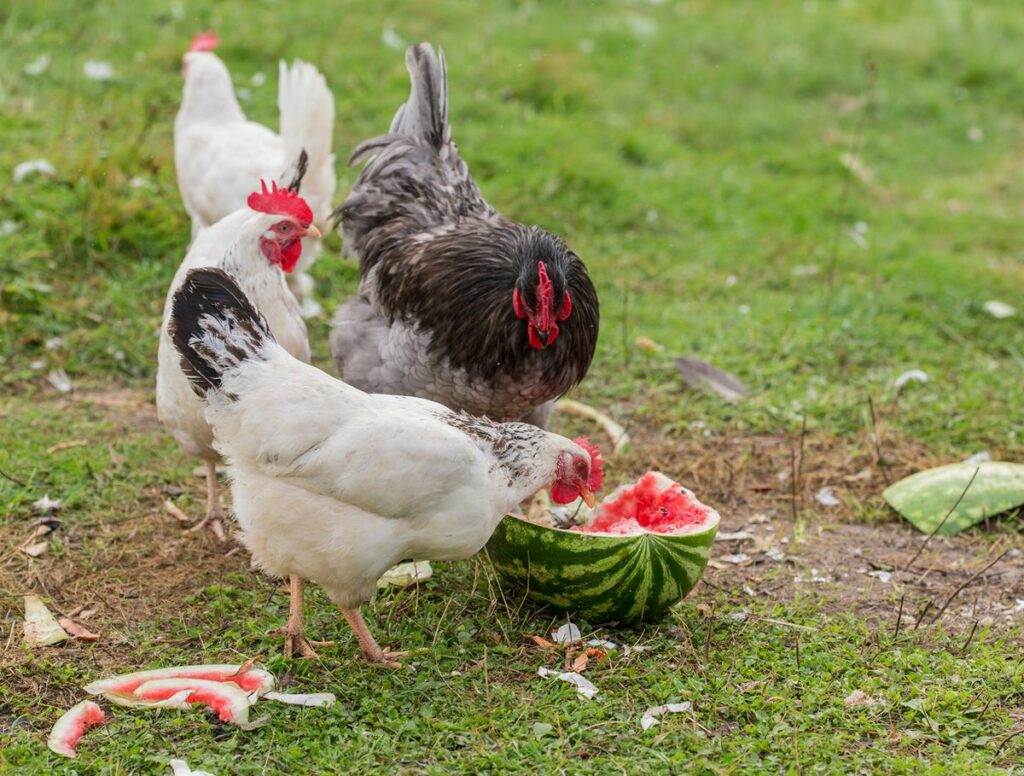
Can Chickens Have Apples?
Yes, chickens like apples, but the core and seeds can be toxic. Chunks of apples could cause choking hazards, so chop up the fruit before serving it. You can also give it in the form of applesauce.
Can Chickens Eat Pineapple?
Yes, if chickens have pineapple, they’ll be safe. Yet, many birds aren’t interested in the flavor. It’s high in vitamins and minerals, but it should only be an occasional snack since it’s also high in sugar.
Can Chickens Eat Bananas?
Yes, chickens can have bananas regularly. They’re full of nutrients like vitamin B6, vitamin C, vitamin A, niacin, potassium, iron, and magnesium. Banana peels for chickens are also safe, but your hens might not show interest in them.
Can Chickens Eat Mango?
Yes, mango is a healthy snack for chickens. Yet, it’s high in sugar and carbohydrates, so it should only be served in moderation. Chickens love if it’s made into frozen slushies on hot days. Hens can also snack on mango skins.
Can Chickens Eat Cantaloupe?
Yes, cantaloupe is rich in vitamins A, B, and C. Chickens love to peck at the rind and the seeds too. Yet, you should only serve it in moderation because too much can give them diarrhea.
Can Chickens Eat Kiwi?
Yes, kiwi and kiwi skin are healthy for chickens. Kiwi is packed with vitamins, minerals, and antioxidants, but also lots of sugar, so only serve it as an occasional snack.
Can Chickens Eat Blackberries?
Yes, blackberries are a safe snack that many chickens enjoy. Even though these berries are a favorite for many birds, they shouldn’t become a main part of their diets.
Can Chickens Eat Pomegranate?
Yes, pomegranates are safe for chickens to have. Hens will even peck at the skin and eat the seeds.
Can Chickens Have Peaches?
Yes, peaches are a nutritious fruit that many birds adore. However, the pits have cyanide, making them toxic to chickens. So, remove the pit before serving it.
Can Chickens Eat Pumpkin?
Yes, pumpkins and pumpkin seeds are both safe for chickens. Chickens can be entertained by pecking at pumpkins for hours. Pumpkin seeds may also protect them from worms and other parasites.
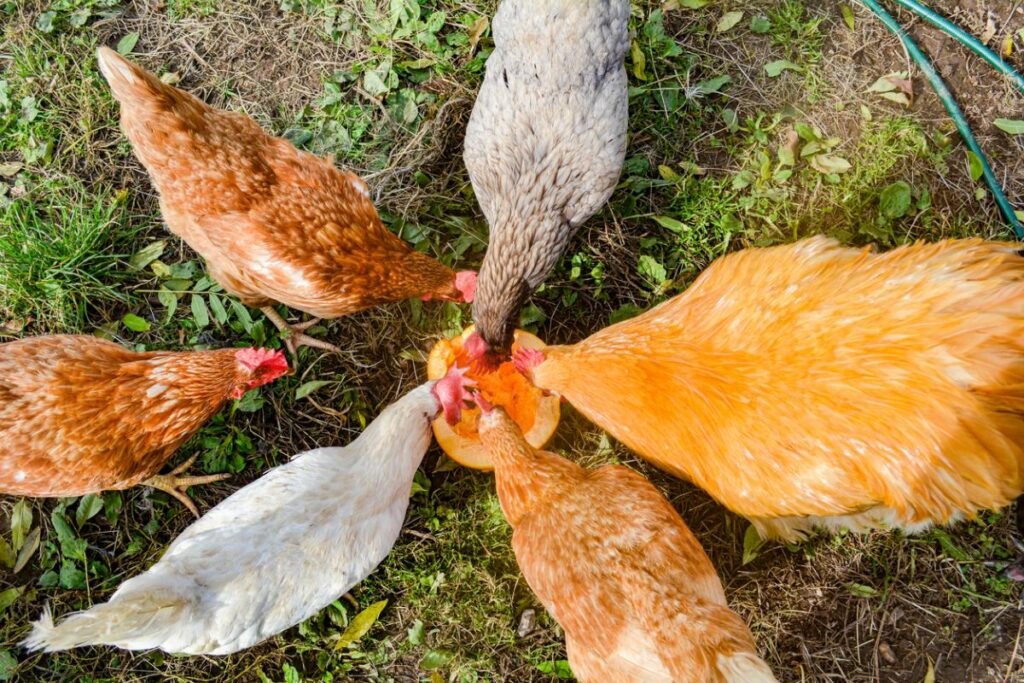
Can Chickens Eat Bell Peppers?
Yes, chickens can eat the fruit of bell peppers, but there are some risks. They can eat green, red, and hot peppers, but you should never give them the leaves, plant, or flowers. That’s because it’s a nightshade plant, so those parts contain solanine.
Can Chickens Eat Zucchini?
Yes, chickens can have zucchini, especially when it’s raw. It contains vitamins and minerals that can help prevent your birds from getting infected with worms. They can eat the seeds and exterior, but the best way to serve them is by chopping them up.
Can Chickens Eat Coconut?
Yes, chickens can have coconut as long as it’s not sweetened. Fresh coconut, coconut water, and coconut milk are all examples of ways to serve this fruit to chickens.
Can Chickens Eat Citrus?
Yes, chickens can have citrus, such as oranges, lemons, grapefruit, and limes. However, most chickens are uninterested in the flavor, so it’s not a favorite.
What Vegetables Can Chickens Eat?
Vegetable treats for chickens are also a healthy snack, so here’s a list of the best vegetables for chickens. Keep reading to find out why they’re safe, how to serve them, and what to be cautious of.
- Carrots
- Arugula
- Potatoes
- Sweet Potatoes
- Corn Husks
- Peas
- Lettuce
- Cabbage
- Kale
- Leeks
- Radishes
Can Chickens Eat Carrots?
Yes, chickens can have carrots whether they’re raw or cooked. Most chickens prefer carrots that are cooked and chopped up since they’re easy to eat. Avoid serving them canned carrots since they often contain a lot of salt.
Can Chickens Eat Arugula?
Yes, many chickens love eating arugula. It’s nutritious while also having an appealing peppery taste.
Can Chickens Eat Potatoes?
Yes, chickens can have potatoes that are cooked or raw. However, the green parts, such as leaves and stems, contain solanine, which can be poisonous for your hens. So, only give them the potato part of the plant.
Can Chickens Eat Sweet Potatoes?
Yes, sweet potatoes are another form of potato that’s great for chickens. They’re easily digestible and contain a lot of essential vitamins and minerals. Sweet potato skins are also safe for birds.
Can Chickens Eat Corn Husks?
Yes, chickens can have corn and corn husks. They love to peck at corn on the cob, but it should not replace their chicken feed. However, corn husks have no nutritional value, so most birds ignore them.
Can Chickens Eat Snap Peas?
Yes, peas, including sugar snap peas, are safe for chickens to have. Chickens enjoy pecking at these healthy snacks, but they might not be too interested in the flavor.
Can Chickens Eat Lettuce?
Yes, lettuce is good for chickens in moderation. Most birds love pecking at it, but you should avoid iceberg lettuce. Too much iceberg lettuce can cause diarrhea, which isn’t worth it since it has little nutritional value.
Can Chickens Eat Cabbage?
Yes, cabbage is a healthier alternative to lettuce for chickens. It’s packed with vitamins and minerals, and chickens enjoy pecking at it.
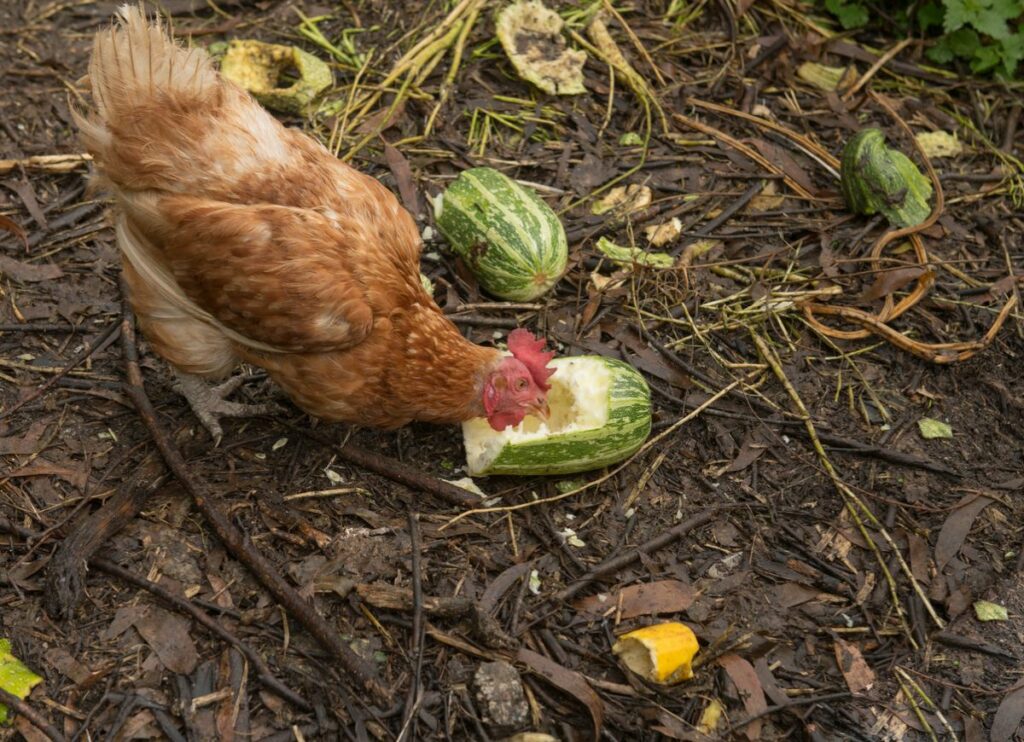
Can Chickens Eat Kale?
Yes, kale is a healthy snack whether it’s raw or cooked. It’s full of potassium, which can lower the risk of heart disease in chickens. Kale may also maintain healthy vision.
Can Chickens Eat Leeks?
Yes, chickens can eat leeks in moderation. They’re rich in vitamins, and they’re safest if they’re diced.
Can Chickens Eat Radishes?
Yes, chickens love radishes, even the leaves. They’re packed with vitamins and minerals, but it’s recommended that you chop them up before serving them.
What Grains Can Chickens Eat?
Many people think of birds eating grains, so there are a few that you can give chickens as a snack. Here’s a list of safe grains and similar foods, followed by details about each one.
- Bread
- Oatmeal
- Rolled Oats
- Sunflower Seeds
Can Chickens Eat Bread?
Yes, even though bread is dangerous for ducks, it’s safe for chickens to nibble on. If you need to fatten up your hens, you can give them bread soaked in milk. Most chickens love the taste of bread, but it doesn’t provide many health benefits. So, only serve it in moderation.
Can Chickens Eat Oatmeal?
Yes, chickens can eat both raw and cooked oatmeal. Oatmeal is a great source of protein, vitamins, and antioxidants. Warm oatmeal is an excellent treat on cold days, but don’t give it to them every day.
Can You Feed Chickens Rolled Oats?
Yes, feeding chickens rolled oats on their own is safe. Rolled oats provide the same benefits as oatmeal.
Can Chickens Eat Sunflower Seeds?
Yes, raw and cooked sunflower seeds are both very healthy for chickens. They’re high in fat and amino acids. Most chickens find black oil sunflower seeds to be the most appealing type.
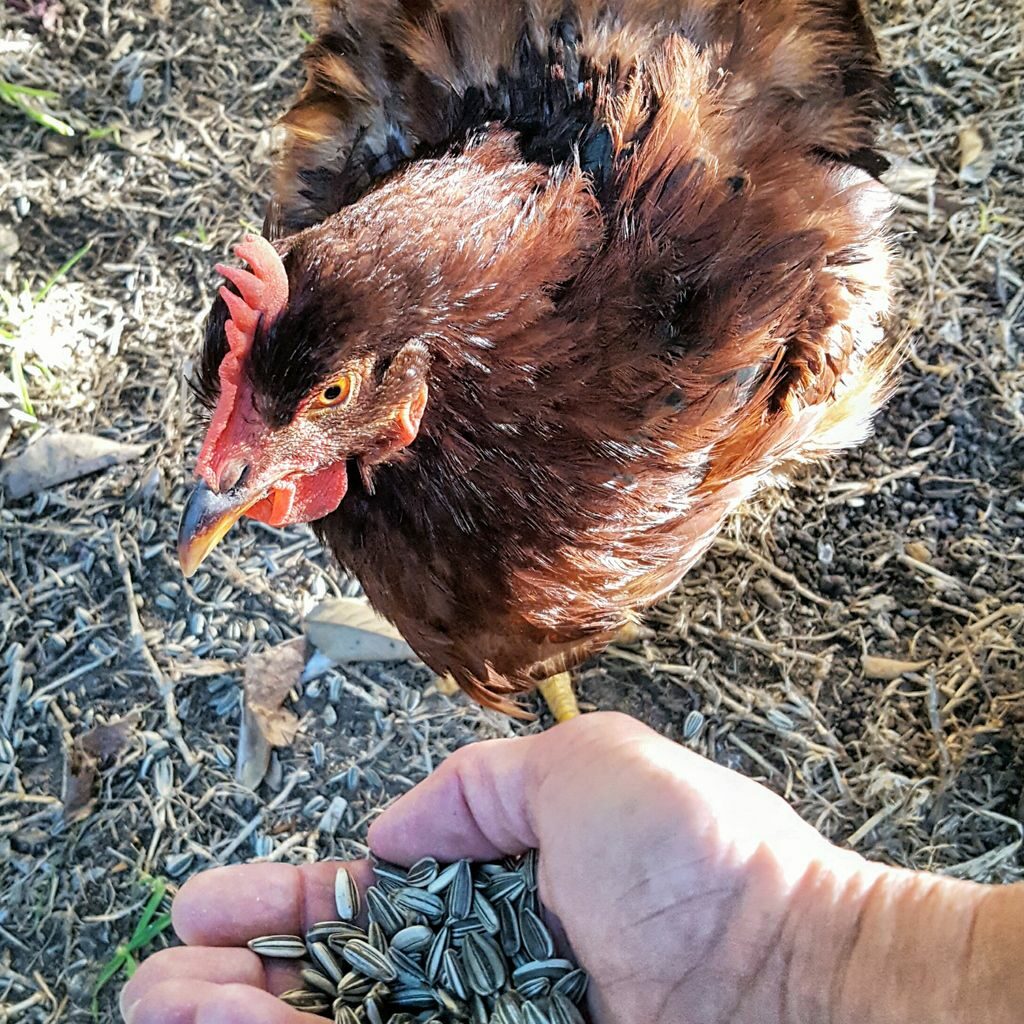
What Other Snacks Can Chickens Eat?
Chickens enjoy a variety of snacks, which is why they like to forage. If you want to spice up their diets a bit, consider one of the following foods. If you keep reading, you’ll see the benefits, risks, and serving advice for each one.
- Peanut Butter
- Peanuts
- Honey
- Pecans
- Tuna
- Shrimp
- Cashews
- Basil
- Cinnamon
Can Chickens Eat Peanut Butter?
Yes, chickens can have peanut butter but it should only be served in small amounts. Peanut butter is high in fat, carbs, and protein, so it’s best served when chickens are molting.
Can Chickens Eat Peanuts?
Yes, it’s safe for chickens to consume peanuts, but it doesn’t seem to provide many benefits. So, it’s a good idea to give them something more nutritional.
Can Chickens Eat Honey?
Yes, honey is full of antioxidants that can reduce stress levels in birds. So, you can add some honey to their water as an easy way to give them the benefits.
Can Chickens Eat Pecans?
Yes, chickens can have pecans. Like most nuts, you should chop them up first to avoid choking hazards.
Can Chickens Eat Tuna?
Yes, tuna and other types of fish are safe for chickens to have. Tuna is a great source of protein, amino acids, fat, calcium, and phosphorus. It’s only beneficial if served in moderation.
Can Chickens Eat Shrimp?
Yes, chickens love to snack on shrimp and shrimp shells. However, you need to ensure that the shrimp is plain and has no added seasoning.
Can Chickens Eat Cashews?
Yes, chickens can have cashews as long as they’re not salted or flavored in any other way. Since they’re an unusual shape, they can become a choking hazard, so break them up before serving them to your flock.
Can Chickens Eat Basil?
Yes, basil is rich in vitamins and minerals for chickens. No parts of the basil plant contain toxins for chickens, so they’ll happily consume the stem, flower, and seeds too.
Can Chickens Eat Cinnamon?
Yes, chickens can consume cinnamon. Cinnamon has antibacterial properties and plenty of antioxidants. Adding a little to their diets can give them added health benefits.
Can Chickens Eat Popcorn?
Yes, popcorn is a great source of vitamins A, E, and K. As long as you don’t add butter or salt to it, chickens can benefit from its minerals and fiber.
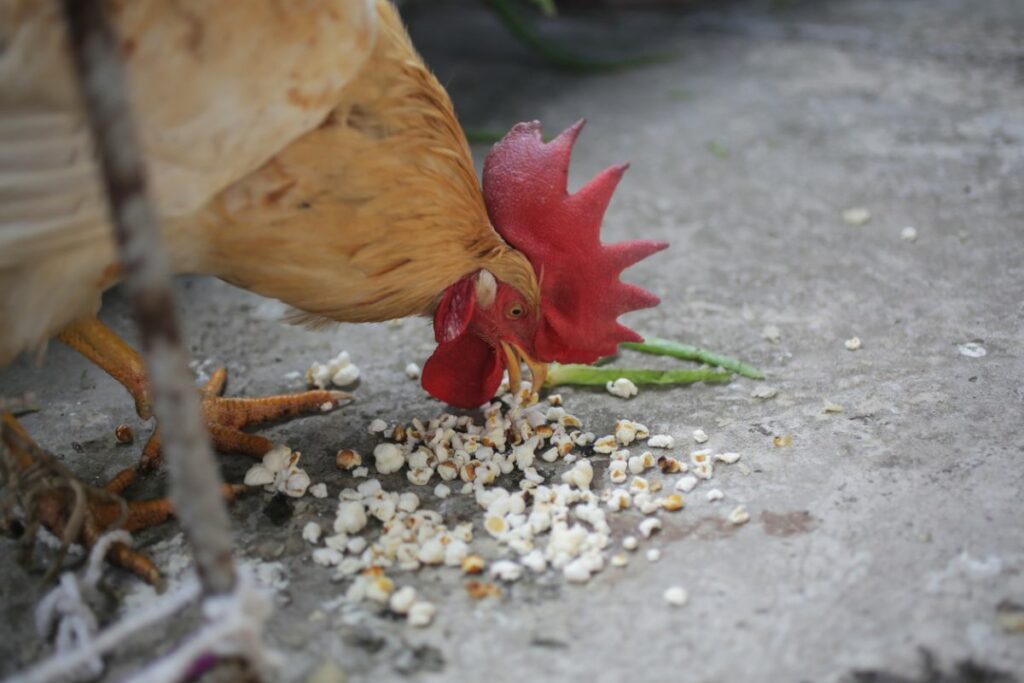
What Foods Can Chickens Not Eat?
Even though chickens can snack on many humans foods, there are still plenty that they should avoid. Here’s a “what can chickens not eat list”, followed by an explanation of why each one is bad for them.
| Marshmallows | Mushrooms |
| Cheese | Chocolate |
| Chocolate Cake | Butter |
| Onions | Yogurt |
| Avocado | Pickles |
| Acorns |
Can Chickens Eat Marshmallows?
No, even though marshmallows aren’t poisonous to chickens, they should be avoided. The treat is high in sugar and serves no benefit to chickens.
Can Chickens Eat Mushrooms?
Sometimes chickens can eat mushrooms, but they should be served with caution. Chickens can eat any mushrooms that are safe for humans, but they’re not an ideal snack. Keep your flock away from any wild or unidentified mushrooms.
Can Chickens Eat Cheese?
Sometimes cheese is okay to serve. It’s not toxic in any way, but feeding high amounts of dairy can be difficult for chickens to process, which could lead to digestion problems. If possible, choose a healthier snack.
Can Chickens Eat Chocolate?
No, chocolate is toxic for your flock because it contains theobromine. So, keep the sugary snack to yourself.
Can Chickens Eat Chocolate Cake?
No, chickens shouldn’t have leftover cake, especially not chocolate cake. Chocolate cake will have the same toxicity as pure chocolate. A few bites of cake or frosting might not harm them, but it’s best to avoid it.
Can Chickens Eat Butter?
Sometimes butter is okay to serve. It has nutrients and protein, but it’s high in fat and salts, so it’ll do more harm than good.
Can Chickens Eat Onions?
No, onions can cause a condition called hemolytic anemia. So, even though they contain some beneficial vitamins and minerals, it’s not worth the risk.
Can Chickens Have Yogurt?
Sometimes yogurt is okay for chickens. The beneficial bacteria in yogurt is great for a chicken’s immune system, but yogurt is still a dairy product, so it may be difficult for them to digest.
Can Chickens Eat Pickles?
No, pickles aren’t ideal for chickens because they’re processed using high amounts of salt and sugar.
Can Chickens Eat Avocado?
No, chickens shouldn’t have any avocado because the leaves, skin, and pit contain persin, which is toxic. The flesh of the fruit is fine, but it’s not worth the risk.
Can Chickens Eat Acorns?
No, acorns can be toxic and harmful to chickens. They might seem like a common treat to forage for, but they contain tannins, which are poisonous to chickens.
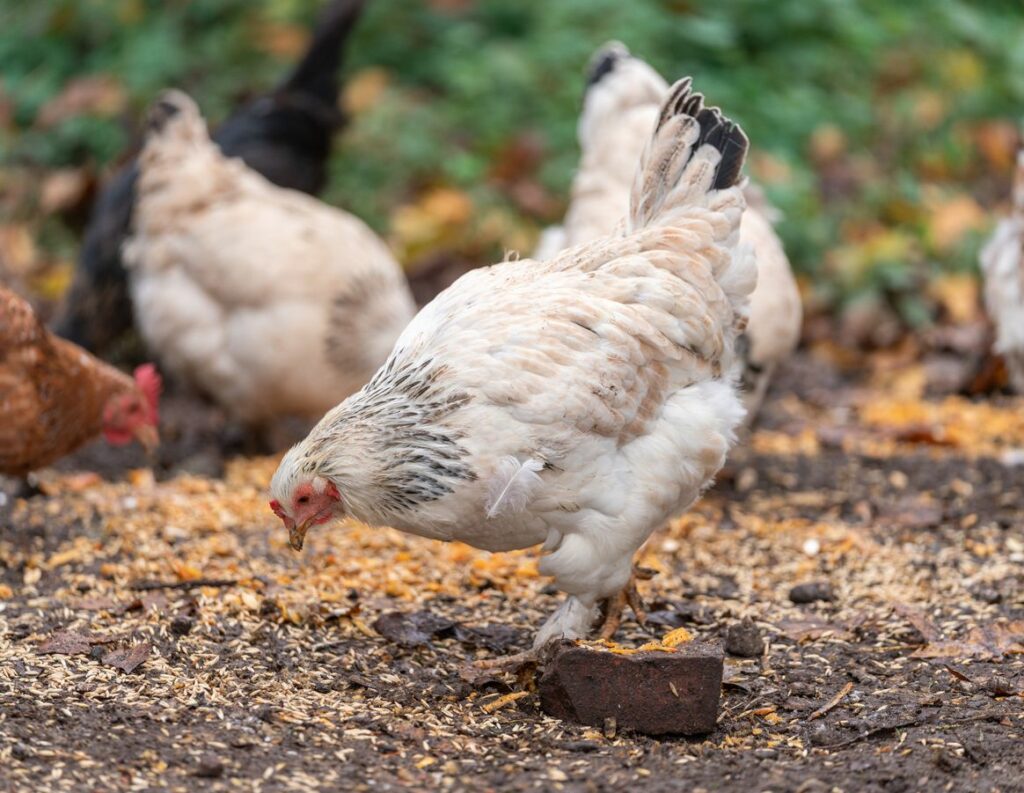
How Much Do Chickens Eat?
Now that you know what chickens can snack on, you might be wondering when they feed and how much they consume. Chickens feed consistently throughout the day, so they should always have feed accessible to them while they’re awake.
Each chicken eats about 1/4 pound of feed daily, which is the equivalent of a 1/2 cup. Younger chickens that are still growing will eat more. These estimates refer to their food alone, not their treats. Treats to give chickens should be in addition to the food without going overboard.
Treats shouldn’t make up more than 10% of a hen’s diet. Chickens love variety, so give them different treats each day to create a balanced diet for chickens. When choosing treats to serve them, make sure you focus on ones that can benefit their health.
Frequently Asked Questions
There are lots of human foods that are safe for chickens to have, but there are still plenty that they should be cautious about. Before you decide what snacks to serve your chicken, you may have some lingering questions, such as the following.
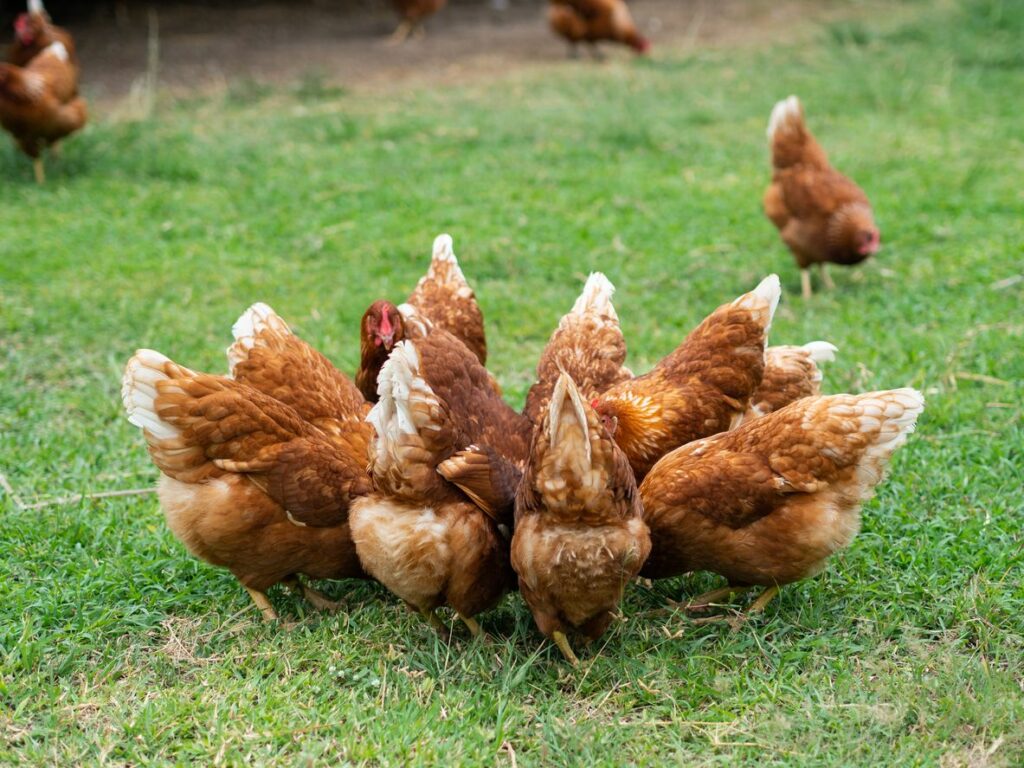
Yes, chickens eat grass regularly when they forage. It shouldn’t be a main part of their diets, but as long as it’s not sprayed with pesticides or other chemicals, it should be safe.
Yes, chickens may also pick up worms while they’re foraging, so they can be a healthy snack. Give chickens red wigglers or earthworms as opposed to mealworms because mealworms can be contaminated and cause health problems for the birds. Red wigglers are high in protein and nutrients.
No, chickens should never consume anything with mold on it, especially not moldy bread. Rotten food can make chickens sick just like they can for any other animal. If you see mold on any of your chicken’s food or treats, discard them and give them something fresh.
Final Thoughts
If you’ve ever wondered “what foods can chickens eat?”, the answer is a lot! Chickens aren’t picky eaters. Most of the time, they’ll eat whatever food they can find. Yet, not all foods you serve to them will be healthy and safe.
If you’re ever unsure about a food item, don’t serve it to your flock. Certain foods can be dangerous or deadly, so it’s better to be safe than sorry. Keep that in mind next time you choose a snack for your feathered friend.
